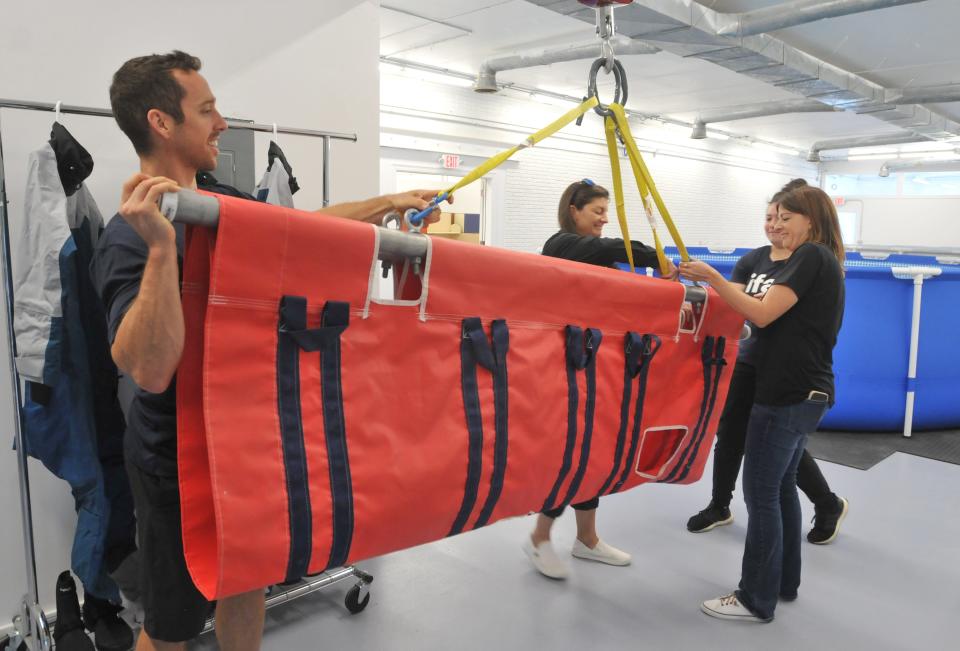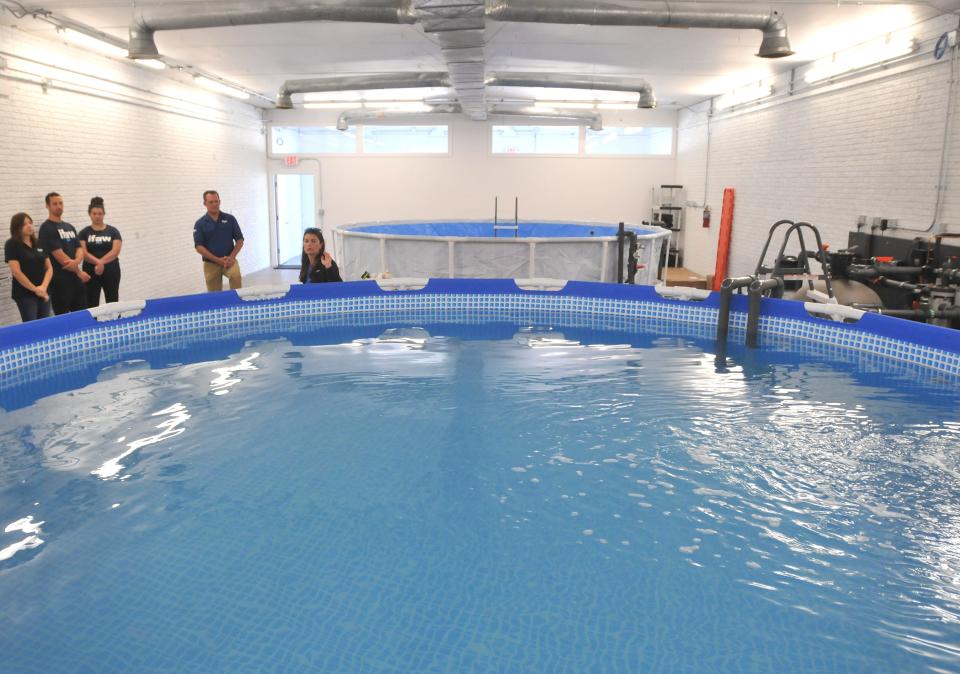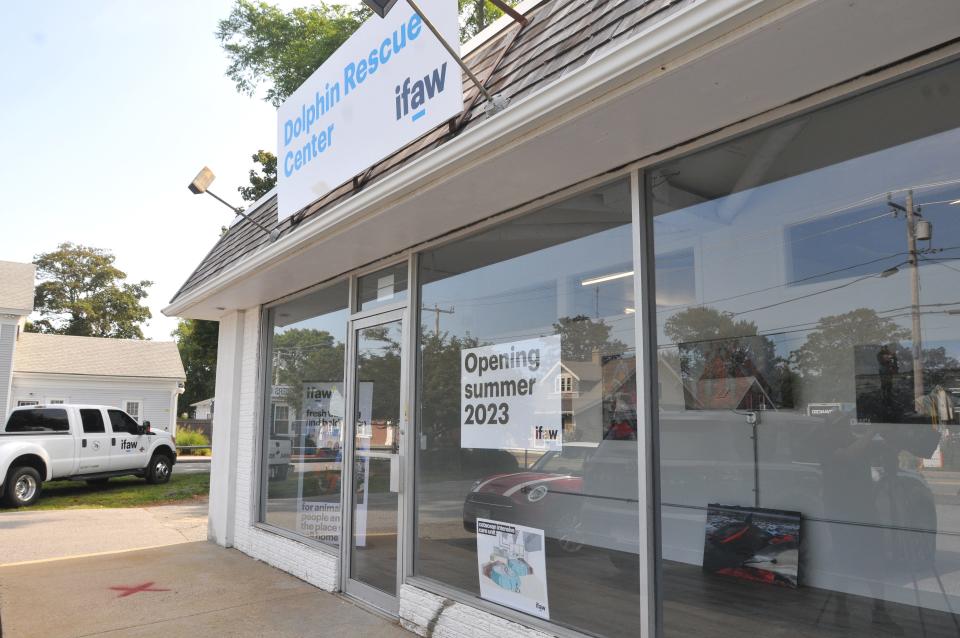70 strandings a year. Dolphin rescue group opens short-term treatment center in Orleans
ORLEANS — Beyond the glass door of a 4,200-square-foot storefront next to the Kid & Kaboodle children's boutique on Route 6A in Orleans, an unusual operation has taken up residence — not a retail endeavor, but a haven for dolphins and other small cetaceans.
Within, behind a hospital-white wall hung with images of stranded dolphins receiving care from human rescuers, saltwater percolates through twin 4,500-gallon pools, each 15 feet in diameter. On a deck built between them lies a large red sling with black straps, and a plastic tote filled with lidded vials for holding biological samples, swabs, and other medical supplies.
All that's missing from this cetacean emergency room are dolphins. But that won't be the case for long, as Cape Cod is recognized as a global hotspot for dolphin strandings.
That's the reason the International Fund for Animal Welfare, a wildlife rescue and conservation organization, is opening a dolphin rescue center at 115 Route 6A. It will fill a critical need for space to provide intensive care for the most at-risk dolphins and porpoises that strand on Cape Cod's shores.
A 'missing piece of the puzzle' after 25 years of rescue work on Cape Cod

Brian Sharp, director of IFAW’s marine mammal rescue and research team based in Yarmouth Port, said it's been a long time coming, considering that the nonprofit has been dedicated to cetacean stranding responses on Cape Cod for more than two decades — November will mark 25 years of rescue work here.
"This is the missing piece of the puzzle," Sharp said Tuesday during a sneak peek at the facility that's set officially to begin operating as soon as the National Oceanic and Atmospheric Administration signs off on the final paperwork, expected at any time.
A ceremonial public opening of the center, financed in part by the Dutch Postcode Lottery, will likely take place in October.
Sharp noted that Cape Cod sees more frequent live mass strandings of dolphins than anywhere else in the world, yet there are no facilities for treating them here, nor in fact anywhere north of Florida. That's left local rescuers having to treat stranded animals solely in the field, which isn't always enough.
Additional recovery time may be needed for some stranded dolphins
To have a better chance at survival, Sharp said, some animals require additional diagnostics, more focused treatments, "and sometimes simply additional recovery time that can only be provided at a dedicated facility."
IFAW animal rescue veterinarian Sarah Sharp, Sharp's wife, said as a rescuer she's experienced a lot of heartache over the dolphins she's worked with in the field on Cape Cod.
It's heartbreaking, she said, to let them go after limited waterside intervention, knowing some may only have a 50% chance of surviving without more dedicated care. Her husband agreed, noting that beyond situations where euthanization is necessary, the rescuers' only option has been to do their best to treat the animals in the field, then "release them and hope."
"We're going to be very excited to be able to finally admit patients" who need more care, he said.
A primary goal is to improve survivability

"It will be really amazing to see what we can do," said Sarah Sharp. "The primary goal of this facility is to improve the survivability of these animals."
The team will be able to work with their patients for up to four days in the facility's two treatment pools, and on the deck between the pools, where they will weigh their patients and conduct out-of-water diagnostics and treatments.
The facility also includes an area where frozen and locally-sourced fresh fish will be processed for feeding the patients, in addition to a work and meeting space, and a lab where the team can process blood and blow samples, evaluate x-rays and sonograms, test the treatment tank water and conduct other lab work.
"We'll be able to do those advanced diagnostics" that can't be done in the field, Sarah Sharp said.
While some tests may still need to be sent out, the ability to do most of that work at the facility will allow the wild patients to be treated more rapidly and returned to the ocean sooner, she said, noting the rescuers aim to handle the animals as little as possible.
The center, said Brian Sharp, is ideally located about 20 minutes from the most common stranding spots in Cape Cod Bay.
Can anyone visit the center once it's open?
While visitors won't be able to go into the treatment area, they will be able to visit the public outreach center at the front of the facility, where they can learn about IFAW's efforts in the field and any patients being treated there. There will be a live feed of the treatment pools on a closed-circuit television screen so people can observe activity when there are animals present.
It'll be a chance to "engage people at a whole different level we haven't been able to do before," Sharp said.
The center will also importantly serve to advance understanding of illnesses that affect cetaceans and how best to treat them, as well as how the animals may be affected by capture myopathy, a condition brought on by acute stress of live stranding that is not well understood in cetaceans.
"The more we learn, the more we can help them," Sarah Sharp said.
Orleans center is planned as a place to train marine scientists

Another significant function of the center will be to provide hands-on training for other marine scientists.
According to Brian Sharp, over the last 10 years "25% of live cetaceans that strand in the United States, including Hawaii, Alaska and U.S. territories, stranded off Cape Cod between Barnstable and Wellfleet." The busiest time of year for dolphin strandings is between late December and late April.
Cape Cod's geography and the bay's extreme tidal changes — with a 9- to 12-foot difference between high and low tide — are the main reason strandings happen so often here. Coupled with long, sloping beaches, he explained, "that really creates the perfect place for dolphins to strand, unfortunately."
Strandings do occur on the Atlantic side of the Cape, but are not as common as in the bay.
"We have about 70 live cetacean strandings a year," Sharp said, noting there are about 20 cases per year that would benefit from the short-term, emergency care the center will provide.
The rescuers mostly deal with short-beaked common dolphins, Atlantic white-sided dolphins and harbor porpoises.
Sharp said the team is also seeing more bottlenose dolphins, a species that generally prefers warmer water. In the past, he said, they came across one or two bottlenose dolphins a year. This year they've encountered six or seven.
With warmer waters, a shift in animals that strand may occur
The Gulf of Maine, which includes Cape Cod Bay, is one of the earth's fastest warming bodies of water.
As water temperatures increase, Sharp said, "what we may end up seeing is a shift in the animals that strand here."
At the new rescue center, each pool can hold up to four animals in extreme events, such as mass strandings resulting from hurricanes or oil spills, but usually each pool will hold just one to two animals, Sarah Sharp said. The team is equipped to handle animals up to 700 pounds.
After their treatment, animals will be released back into the wild, though it is expected there will be difficult choices to euthanize animals that are suffering and beyond helping.
Sharp advises anyone who comes across a stranded dolphin to "stay back about 150 feet, for their safety as well as the animal's safety," and call the IFAW hotline at 508-743-9548.
Heather McCarron writes about climate change, environment, energy, science and the natural world. Reach her at hmccarron@capecodonline.com, or follow her on Twitter @HMcCarron_CCT
Thanks to our subscribers, who help make this coverage possible. If you are not a subscriber, please consider supporting quality local journalism with a Cape Cod Times subscription. Here are our subscription plans.
This article originally appeared on Cape Cod Times: Dolphin rescue center planned for former Orleans Auto Supply

